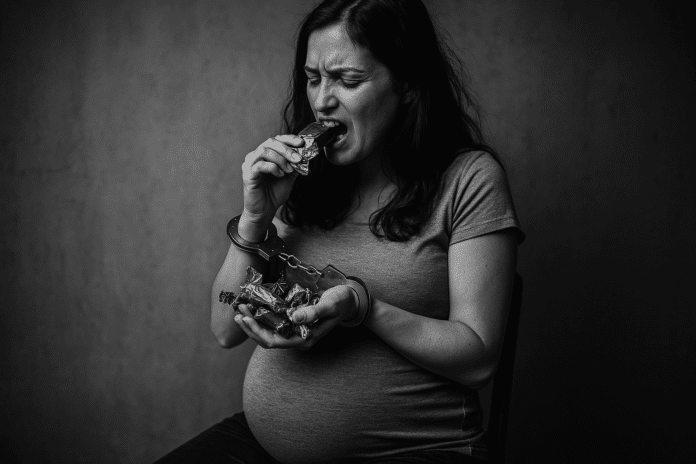On its face, a Snickers bar is just candy. But in the wake of Kansas’ new fetal personhood law, critics are asking a provocative question: Could a pregnant woman be prosecuted for eating one?
That may sound extreme, but it’s the kind of legal and ethical dilemma that reproductive justice advocates say is not only possible, but increasingly likely under the state’s new law.
On April 10, the Kansas Legislature overrode Governor Laura Kelly’s veto of House Bill 2062, a measure that grants new legal status to fetuses by requiring child support payments from the point of conception and allowing parents to claim unborn children as tax dependents. While lawmakers pitched the bill as a compassionate effort to support families, critics say it opens the door to something much more dangerous: criminalizing the behavior of pregnant people.
Now, with Kansas legally recognizing certain rights of unborn children, some wonder if dietary choices—such as a woman with gestational diabetes consuming excessive sugar—could eventually fall under scrutiny. Could she be accused of harming her fetus? Could she face charges of child endangerment, or even abuse?
A Nation Already Testing the Limits
While no one in Kansas has yet faced charges for their snack choices during pregnancy, similar cases across the country suggest the risk is more than theoretical.
- In South Carolina, Regina McKnight was convicted of homicide in 2001 after her stillbirth was linked to cocaine use. The conviction was overturned, but not before she served eight years in prison.
- In Alabama, a chemical endangerment law meant to target meth labs has been used to prosecute more than 500 women for drug use during pregnancy, some of whom were arrested immediately after giving birth.
- In Oklahoma, Brittney Poolaw was sentenced to four years in prison for manslaughter after miscarrying at 17 weeks. The medical examiner listed multiple contributing factors, including drug use, but the conviction drew national outrage.
“What we’re seeing is a patchwork of fetal personhood laws being used to surveil, criminalize, and punish women for anything less than perfect pregnancies,” said Lynn Paltrow, executive director of National Advocates for Pregnant Women. “And it never stops with the most extreme cases. It starts there, and then it creeps.”
Kansas’ New Law: Compassion or Control?
House Bill 2062 now allows parents to claim a $2,320 tax exemption for an unborn child and requires that child support payments begin at conception. Supporters, including anti-abortion groups like Kansas Family Voice and the Kansas Catholic Conference, argue the bill provides much-needed assistance to families.
But Governor Kelly saw something else in the bill. In her veto statement, she called the measure a “backdoor attempt to undermine reproductive freedom” and warned that it “erodes the legal distinction between a fetus and a person in ways that could threaten healthcare access and criminalize pregnancy.”
That warning, for many, is more than political rhetoric.
Medical Decisions Under Legal Threat
Consider a woman diagnosed with gestational diabetes—a common pregnancy complication that requires dietary control to avoid harm to the fetus. If that woman were to eat candy bars against medical advice and later suffered complications, would the state argue that her actions constituted child abuse?
Under current Kansas law, probably not. But with HB 2062 blurring the lines of personhood, reproductive rights advocates say it’s only a matter of time before someone tries.
And history shows the shift can happen quickly. Once fetal rights are enshrined in one area of law—such as taxes or support—courts may begin interpreting other laws through the same lens.
“Now that Kansas has recognized a fetus as a dependent, it’s only a short legal leap to say that a fetus is also a victim,” said Reva Siegel, a professor at Yale Law School who studies reproductive law. “And if a fetus can be a victim, then pregnant women can become perpetrators.”
Doctors Caught in the Crosshairs
This shift doesn’t only affect pregnant women—it impacts doctors, too. Some physicians may become reluctant to treat high-risk pregnancies for fear that outcomes could lead to criminal investigations.
“Healthcare providers should not have to practice medicine with a lawyer on their shoulder,” said one Kansas OB-GYN who spoke on condition of anonymity. “We’re already seeing a chilling effect in states with fetal personhood laws.”
Where Kansas Goes Next
For now, the idea of prosecuting someone for a candy bar seems far-fetched. But laws don’t always operate in the realm of the rational—they evolve based on precedent.
Kansas voters made headlines in 2022 by decisively rejecting a constitutional amendment that would have removed abortion protections. But two years later, the legislature is reshaping those protections through financial, legal, and moral frameworks—redefining when life begins, and who is accountable for it.
If a Snickers bar becomes evidence in a criminal case someday, we shouldn’t say we didn’t see it coming.
Want to weigh in?
Email your thoughts to [email protected] or join the conversation on Facebook.
Tags: #KansasLegislature #FetalPersonhood #ReproductiveRights #GestationalDiabetes #HB2062 #TopekaNews





